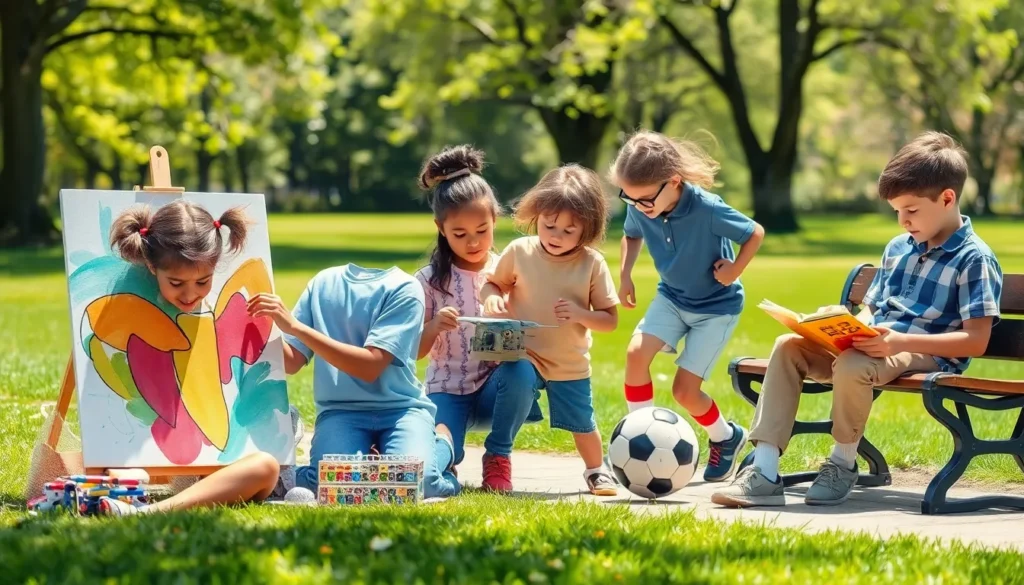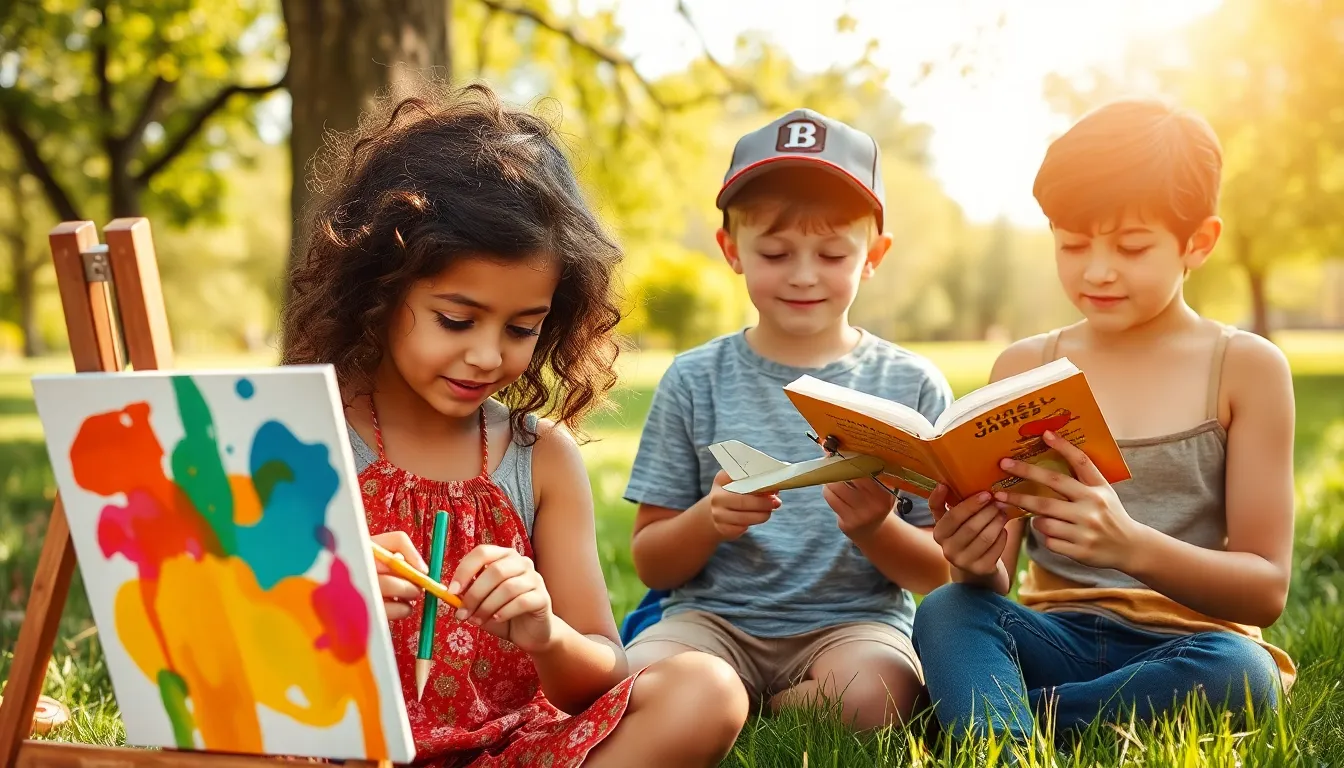Every child is a little bundle of energy and creativity, just waiting to find their passion. Whether it’s building a Lego fortress or perfecting their dance moves in the living room, hobbies play a crucial role in shaping young minds. Not only do they keep kids entertained, but they also help develop essential skills like problem-solving and teamwork.
Imagine a world where kids trade their screens for paintbrushes or soccer balls. Sounds like a dream, right? But the reality is that nurturing a hobby can spark joy and foster lifelong interests. From crafting to coding, the possibilities are endless. So, let’s dive into the wonderful world of children’s hobbies and discover how these fun-filled activities can ignite their imagination and boost their confidence. After all, who wouldn’t want a future Picasso or a mini Einstein in the making?
Table of Contents
ToggleOverview Of Children’s Hobbies
Children’s hobbies encompass a wide variety of activities that promote growth and creativity. Engaging in these pursuits fosters collaboration among peers, enhancing social skills. Art, music, sports, and reading figure prominently among popular hobbies.
Creativity thrives through art activities, allowing children to express emotions and ideas. Music appreciation cultivates discipline, as learning instruments or singing contributes to cognitive development. Participation in sports encourages teamwork while promoting physical health.
Reading presents another essential hobby, improving language skills and expanding imagination. Through books, children explore different worlds, cultures, and ideas. Nature-related hobbies, such as gardening, introduce environmental awareness while nurturing responsibility.
Crafting serves as a gateway for building fine motor skills through hands-on activities. Puzzles and building blocks stimulate critical thinking and problem-solving capabilities. Outdoor activities like hiking and biking promote physical fitness and a sense of adventure.
Collecting items, whether stamps or rocks, encourages organization and can spark curiosity about history or science. Volunteering can also be a fulfilling hobby, teaching empathy while contributing positively to communities.
Overall, children’s hobbies play crucial roles in shaping personalities and interests. By exploring various activities, children build confidence and discover lifelong passions.
Types Of Children’s Hobbies

Children’s hobbies encompass a wide array of activities that nurture creativity, physical health, and education. These pursuits can significantly influence a child’s development and interests.
Creative Hobbies
Creative hobbies stimulate imagination and self-expression. Activities like painting, drawing, and sculpting encourage children to explore their artistic talents. Craft projects provide hands-on experiences that build fine motor skills. Music, through instruments or singing, fosters an appreciation for rhythm and melody. Dance allows children to express emotions while enhancing coordination. Drama clubs or acting workshops enhance public speaking skills and confidence. Overall, engaging in creative hobbies can ignite lifelong passions and provide meaningful outlets for feelings.
Physical Hobbies
Physical hobbies promote health and encourage teamwork. Sports such as soccer, basketball, or swimming build physical endurance and social skills. Outdoor activities, like hiking or cycling, connect children with nature while improving fitness. Martial arts teach self-discipline and respect alongside physical strength. Dance classes enhance coordination and flexibility in a fun, energetic environment. Group activities often lead to friendships and teach cooperation. Ultimately, engaging in physical hobbies keeps children active and energized while instilling important life skills.
Educational Hobbies
Educational hobbies enrich knowledge and cognitive development. Reading fosters imagination while enhancing vocabulary and comprehension. Science experiments or building kits encourage problem-solving and critical thinking. Gardening teaches children about ecosystems and responsibility through hands-on learning. Puzzles and board games develop strategic skills and patience. Joining clubs related to interests, like robotics or coding, prepares children for future careers. Overall, educational hobbies cultivate a love for learning and an understanding of the world around them.
Benefits Of Encouraging Children’s Hobbies
Children’s hobbies offer significant advantages for their growth and development. Engaging in hobbies enhances various skills that contribute to a well-rounded individual.
Developmental Benefits
Hobbies facilitate cognitive development by providing opportunities for children to solve problems and think creatively. Engaging in art projects helps them express emotions while honing fine motor skills. Practicing musical instruments encourages discipline and patience, enhancing focus. Participation in sports improves physical health and strengthens coordination. Reading regularly expands vocabulary and stimulates imagination. Activities like gardening foster a sense of responsibility and awareness of the environment. These diverse developmental benefits not only boost confidence but also lay the foundation for future learning.
Social Benefits
Hobbies promote social skills through teamwork and collaboration. Joining group activities like sports teaches children how to communicate and work together towards a common goal. Participating in clubs or arts programs creates friendships based on shared interests. Hobbies provide platforms for children to express themselves while understanding different perspectives. Engaging in volunteer work cultivates empathy and reinforces community ties. The combination of these social experiences builds a sense of belonging and mutual support, essential for psychological well-being. Overall, hobbies significantly shape children’s social interactions and relationships.
Tips For Supporting Children’s Hobbies
Supporting children’s hobbies is vital for their growth and development. These activities nurture creativity and help build skills while fostering joy and engagement.
Providing Resources
Access to necessary resources significantly enhances children’s hobby experiences. Parents can provide art supplies, musical instruments, or sports equipment based on children’s interests. Libraries offer a wide range of books to encourage reading, while community centers may host clubs or classes. Learning materials available online help children explore new hobbies independently. Local parks provide spaces for outdoor activities and play. Always consider affordability and accessibility when choosing resources. Ensuring children have what they need allows them to fully immerse themselves in their interests.
Creating An Encouraging Environment
An encouraging environment fosters creativity and enthusiasm in children’s hobbies. Setting up a designated space for activities, like a craft corner or reading nook, promotes focus. Regularly celebrating achievements, big or small, boosts confidence and motivation. Parents can also engage in hobbies alongside their children, demonstrating the value of these pursuits. Open communication enables children to express their preferences and desires, leading to more enjoyment. Minimizing distractions, such as screens, helps maintain concentration. Creating a positive atmosphere lays the groundwork for growth, exploration, and lifelong passion in hobbies.
Fostering children’s hobbies is essential for their overall development. These activities not only spark creativity but also build vital skills that shape their futures. By engaging in various hobbies, children learn to collaborate with peers and express themselves emotionally.
Parents play a crucial role in this journey by providing resources and support. Creating an environment that encourages exploration allows children to discover their passions and interests. As they immerse themselves in these pursuits, they’ll develop confidence and a sense of belonging.
Ultimately, nurturing hobbies in childhood lays the foundation for lifelong learning and personal growth. Encouraging these interests today can lead to a brighter and more fulfilling tomorrow.



